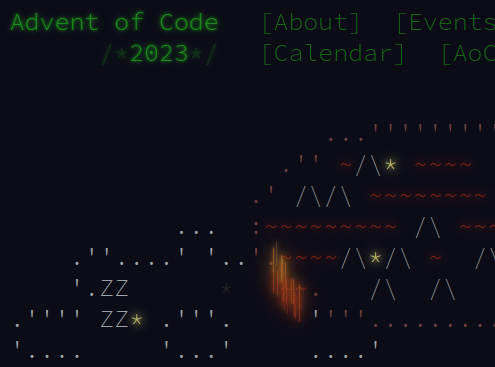Finally



Day 25 strikes me as much harder than most Day 25’s, and I ain’t the only one. I mean, come on, 2020 was the year where you basically played a tribute to Zork. (Or maybe it was 2019, and 2020 was the relatively easy discrete log puzzle.)
But today’s puzzle? Part 1 alone should count as a two- or even three-part problem. I won’t even bother covering up the “spoilers”, as I bet revealing them won’t spoil much at all.
The moment I read the problem, I knew it was a graph theory problem. I don’t know much graph theory – I’m not that kind of mathematician; I did real math  with nonlinear polynomials and stuff; see my solution to Day 24 or whatever – so I immediately went to look up stuff on graph connectivity, which I’d heard and read something. That led me to “min cuts”, a new idea to me, then to Karger’s algorithm, and that looked both appealing and tractable, so I said, “aha! let me implement this!”
with nonlinear polynomials and stuff; see my solution to Day 24 or whatever – so I immediately went to look up stuff on graph connectivity, which I’d heard and read something. That led me to “min cuts”, a new idea to me, then to Karger’s algorithm, and that looked both appealing and tractable, so I said, “aha! let me implement this!”



Three hours and a boatload of annoyance later, I was still struggling to implement Karger’s algorithm. I think I was close, and I may yet get it working, but at this point it was time to spend time with my family, so I did.
When I came to look at it, a stroke of divine inspiration hit – ok, maybe not divine, but it is Christmas so what do I know – and I had the idea to generate a bunch of random paths through the graph and count the edges used. It stood to reason that the edges used most were the load-bearing ones that guaranteed connectivity.



A couple of hours and some deep frustration later, I was still struggling to get that working, inasmuch as my top 3 hits consistently disagreed with the example’s 3 edges to remove. I finally surrendered to the temptation to peruse Reddit. Per Reddit, or at least the Reddit solutions I could be bothered to read, most people employ one of two approaches.
- Karger’s algorithm to find the min cut of graph.
- A Monte Carlo method that picks two random points a fair number of times, on each turn finds a shortest path (shortest seems to be important, which prompted me to switch from using DFS to BFS – the one time I start with DFS it turns out to be counterproductive!), and keeps a running tally of which edges are used most often. The 3 edges that show up most are, with extremely high probability, the edges you want.
Notice anything familiar? Me, too. I asked myself whether I should feel elated or depressed that most other people were taking one of these two approaches, too – elated that, hey, that’s what the experts were doing; depressed that, yeah, I can’t seem to cut it.
I downloadeded Conscious-Money-7663’s Python solution to use as a sanity check against my code. Its top 3 hits agree with the example’s counsel, so I guess something’s wrong with my code.



After an hour or two of fruitless searching for a bug, I said “What the heck” and tried my code on the input.
It worked.


It ain’t pretty, but I’ll take the  ! From there it was spectacularly easy to finish the puzzle (very easy, same as every Day 25 I’ve done, which now covers 2018…2023).
! From there it was spectacularly easy to finish the puzzle (very easy, same as every Day 25 I’ve done, which now covers 2018…2023).
At some point I’ll go back & try to figure out (a) why my Karger’s Algorithm doesn’t work, and (b) why my Monte Carlo method doesn’t work on the example. But for now I can go  and
and  now, hope my wife doesn’t divorce me, my parents don’t disown me, and my kids haven’t uploaded too many videos complaining that I was spending Christmas trying to solve a stupid puzzle instead of… well, there wasn’t anything else to do, as far as I know, or I’d have done it. But I still got an evil
now, hope my wife doesn’t divorce me, my parents don’t disown me, and my kids haven’t uploaded too many videos complaining that I was spending Christmas trying to solve a stupid puzzle instead of… well, there wasn’t anything else to do, as far as I know, or I’d have done it. But I still got an evil  or two today.
or two today.
Merry Christmas, even if belated.
5 posts - 2 participants
Read full topic


